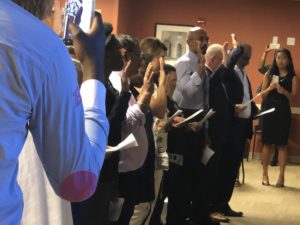
I came expecting to be inspired. My friend Pam had gone to her Polish daughter-in-law’s naturalization ceremony a few years ago and she told me, ”Hearing the stories of the candidates and of the guest speaker’s tremendous success since coming to the US made me proud of my country and grateful to be a US citizen.”
A month or so ago, when I found out that a neighbor had passed his citizenship test and would be going through the ceremony I asked to attend. I knew this young couple didn’t have family members in the area; his parents are in southern India and hers, after having emigrated from India more than 30 years ago, live in Michigan,
Arriving at the office building I took encouragement from the fact that several dark skinned people were gathering their belongings in the parking lot. I must be in the right place. Waiting for the elevator to take me to the 6th floor, I was joined by men, women, and children attired in business casual, ethnic costuming, sportswear, tee shirts, jeans and work pants. As the elevator emptied we entered the office of the US Citizenship and Immigration Services, and joined the line waiting to be admitted. The setup felt intimidating yet reassuring [bctt tweet=”as I reminded myself that since immigration has become such a divisive issue, it’s probably best to err on the side of caution.” username=”@SheilaKCollins”]
The interrogator, a middle aged white man, looked at each person’s picture identification, and asked them why they were here. Looking directly into the eyes of each person he asked, “Are you carrying any firearms or explosive?” Next he had us place our belongings in a basket that was put through an airport style metal detector screening. While waiting for my possessions I learned from one of the employees that two Naturalization Oath Ceremonies are held each Wednesday afternoon, one at 1 pm and the other at 2:30 pm. “At other times we aren’t so busy,” he said.
While we waited in a crowded reception area for the first ceremony to end, I got more details from my friends about how long this process has been for them and how there families felt about it. They had married in 2013 so it has taken nearly 5 years to get to this point. Deepen mentioned that his father didn’t say much but he wasn’t enthusiastic.
“Perhaps he’s nervous or anxious about it?” I suggested. I remembered feeling nervous for this young couple when I met them just before the 2016 election. I feared Deepen might be vulnerable holding only a green card and I reminded Sonia how I’d tried to get her to walk the neighborhood with me to get the vote out. When I learned that in becoming a US citizen, India requires Deepen to relinquish his Indian citizenship, I began to appreciate Deepens father’s mixed feelings.
Trying to reassure me, Deepen said with a smile, “Our two countries have a good relationship.”
At this moment we do,” I said.
Seventeen counties were represented in the group of 28 candidates, and the 40 guests were invited to move around the room to get pictures of their loved ones. The ceremony began with a pre-recorded version of the national anthem and words projected onto a video screen. Images of Ellis Island and emigrants from the late 1800s, mostly white Europeans, followed images of the Statue of Liberty and its inscription, ‘Give me your tired, your poor, your huddled masses yearning to be free.”
In stark contrast, a grim faced President Trump read from a teleprompter, a message that emphasized the responsibilities of citizenship, and congratulated the candidates on their hard work and achievement. The master of ceremony, a white man in his late 30s who was born in the US, offered the story of his grandmother who emigrated from Hungary in the early 20th century. He expressed gratitude to his grandmother for having passed down her family stories to him and he invited the participants to tell their stories, now and in the future. Only one man from Syria took him up on the invitation, but in thanking his Korean born wife who was in the room, he included a bit of her story as well.
Rather than a success story of an immigrant, the guest speaker was a white male representative of the League of Women Voters. I felt some inspiration in his accounting of the history of suffrage in the US – starting from the small group of white males who owned property to white males who didn’t, to, after the civil war, black males, (though many could not exercise their rights due to poll taxes and qualifying exams) to women when women secured the vote in 1920. He mentioned the voting rights act and the civil rights movement, and he urged people to register to vote today, and to vote beginning with this fall’s election.
[bctt tweet=”Though waving tiny American flags and singing God Bless America doesn’t come close to my idea of a celebration, it’s still a good idea, in these times of abusing people who wish to enter our country, for more people born in America to attend these ceremonies and learn more about the process courageous immigrants must endure. ” username=”@SheilaKCollins”]

